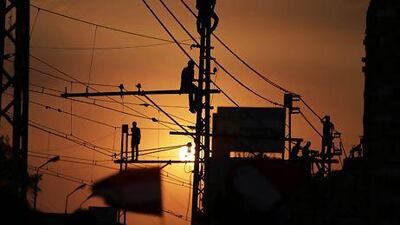Egypt's stocks climbed by the most in a year and its sovereign bond yields fell from record highs yesterday as investors pinned their hopes on a 48-hour ultimatum by the army to end the country's political crisis.
The rally comes as UAE companies with billions of dollars of investments in Egypt await a breakthrough in tensions between the president, Mohammed Morsi, and his opponents.
"We are at a point arguably where anything that breaks this political stalemate, however painful, may be welcomed by foreign investors of all hues," said Hasnain Malik of Frontier Alpha Research, a Dubai-based financial research company.
Egypt's benchmark index rose 4.9 per cent to 4,986.81. The surge helped to ease the benchmark EGX 30 index's losses this year to 6.5 per cent.
The yield on Egypt's US$1 billion of 5.75 per cent 2020 bonds dipped from record highs on Monday by nine basis points to 10.21 per cent.
It follows the announcement by General Abdel Fattah Al Sisi, the defence minister and the head of the armed forces, that Mr Morsi had 48 hours to come to a resolution with the opposition Tamarod movement.
UAE companies are among the largest investors in Egypt, with projects spanning property, banking, ports and energy.
After surviving the turmoil following the 2011 uprising that ousted Hosni Mubarak from power, they are now watching the latest protests against his successor with caution.
A spokesman for Emaar Properties yesterday said Egypt "is one of our core markets, and our operations in the country are ongoing as scheduled".
In October the company announced a joint venture with Al Futtaim Group, a UAE-based company, to build Cairo Gate, a 5 billion Egyptian pound (Dh2.61bn) leisure and entertainment development between the capital and Alexandria. Emaar Properties is already developing Emaar Square, a US$4bn mixed-use project in Cairo.
Damac Properties, another UAE developer, in May resolved a two-year land dispute with Egypt's government. It was one of several legal cases alleging that the Mubarak regime had sold land too cheaply to foreign companies. Yesterday, Damac said it would continue developing its current projects.
If a new government swept to power in the coming days, there was a chance such legal cases could be reopened, said Raza Agha, the chief economist, Middle East and Africa at VTB Capital.
"For those facing or those which have undergone legal battles, the current situation could not only imply delays towards a resolution or even an overturning of a resolution, but if the Egyptian constitution is to be reworked, as protesters have demanded, the legal framework could also change," he said.
A spokesman for DP World, which operates Ain Sokhna Port on the southern end of the Suez Canal, said it was suffering no impact from the unrest and it was "business as usual". The operator has grappled with strikes on several occasions since 2011 that have forced the temporary closure of the port.
Such unrest is part of a broader wave of worker demands for better treatment across the country since the revolution.
The protests of the past few days risk bringing Egypt's fiscal position a step closer to the abyss, say analysts.
With a budget deficit of nearly 12 per cent of GDP, a weakening currency and no sign of the sealing of a $4.8bn IMF loan deal, Egypt had already been slipping towards a fiscal black hole.
The longer the stalemate dragged on the "tougher the economic crisis is to solve", said Mr Malik.
Other UAE investors in Egypt include Emirates NBD, which last month completed the $500 million acquisition of shares in the Egyptian unit of BNP Paribas. The bank yesterday declined to comment on the impact of the political situation.
Dana Gas announced on Sunday it had discovered further gas in Egypt. The company is already the sixth-largest producer in the country, with investments of more than $1.8bn.
